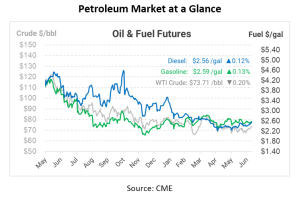
Panic Buying – Do you know how to protect your business?
When unexpected natural disasters happen, they can have devastating effects on communities and supply chains. Recent hurricanes such as Harvey in 2017 in Texas and Louisiana, Irma in 2017, and Ian in 2022 in Florida not only caused destruction but also revealed weaknesses in the United States’ supply chain. A key issue that emerged, especially in the fuel industry, was panic buying. This behavior, driven by fear and uncertainty, highlighted the importance of being prepared for such events.
Panic buying spread like wildfire as the hurricanes approached. People’s memories of recent shortages usually lead them to rush to stock up on items like water, bread, and milk, even in areas far from the storms. Nikki Booth, Senior Manager of Logistics at Mansfield, remembers her own experience of finding empty shelves in Atlanta – 800 miles away from Harvey’s landfall – back in 2017. And the fuel industry was not exempt from the trend.
The consequences of panic buying spread across the nation quickly. Consumers anxiously filled up their gas tanks, and businesses in all sectors followed suit by hoarding bulk fuel supplies. This overordering stressed the transportation network responsible for distributing goods throughout the country. Though everyone had good intentions, this rush unintentionally drove up fuel prices and caused supply shortages. It also increased retains, a situation where the full load of fuel does not fit in the tank and a short-load must be delivered elsewhere. Managing products with limited availability and four times the normal demand posed an incredible challenge for all involved, and the added logistics challenges made deliveries far more difficult.
The fuel industry found itself caught in a perfect storm. To avoid damage, numerous terminals and refineries in Houston had to temporarily shut down, accounting for roughly 20% of the country’s fuel production. This sudden closure triggered a short-term fuel shortage that swept across the Southeast, affecting states from Texas to the Carolinas. As fuel carriers waited in longer lines at terminals, having driven long distances in search of available supplies, their ability to make deliveries was severely compromised. Drivers, who typically handled 4-5 loads per shift, were now only able to manage 1-2 deliveries within the same timeframe. As a result, businesses in various sectors experienced delays in receiving crucial supplies, negatively impacting their operations.
The supply shortages resulting from panic buying have a significant impact on the entire supply chain, emphasizing the importance of continuity planning for individuals and businesses. By being well-prepared, it becomes possible to reduce potential shortages and minimize the disruptive effects of natural disasters.
When panic buying strikes and shortages occur, those who plan ahead will be in the best position to weather the damages. Having a strategic plan involving dedicated local fuel and trucking, backyard tank monitors, emergency fleet cards, and more can keep you running when others run dry.
As we enter hurricane season, it begs the question: Are you prepared?
Mansfield Emergency Response Program
Mansfield Emergency Response Fuel Program is designed for organizations with little margin for downtime. Whether you need backyard, mobile, or generator fueling for your facilities or vehicles, Mansfield’s extensive delivery network and fuel supply points ensure your business will be operational.
Mansfield offers a prescriptive solution to emergency fueling. With flexible components, customers can design the program according to their needs, including temporary fuel storage tanks, dedicated fuel trucks and supply, retail fleet cards, and proactive tank and generator maintenance. Contact us today to learn more about our Emergency Response Fuel Program.

This article is part of Daily Market News & Insights
Tagged:
MARKET CONDITION REPORT - DISCLAIMER
The information contained herein is derived from sources believed to be reliable; however, this information is not guaranteed as to its accuracy or completeness. Furthermore, no responsibility is assumed for use of this material and no express or implied warranties or guarantees are made. This material and any view or comment expressed herein are provided for informational purposes only and should not be construed in any way as an inducement or recommendation to buy or sell products, commodity futures or options contracts.





